Kate Arrow 0:02 Welcome to Leading Insights. Today we're joined by Cat MacAulay. Cat could you tell us a little bit about your role?Cat Macaulay 0:14 Sure. So I'm the chief design officer for Scottish Government's digital Directorate. And that's a fairly new role, I think. Well, I know for Scottish Government. First time we've had the chief design officer. And really what I'm there to do is, I suppose a couple of key things. So one of them is helping to introduce the idea of user centred design, particularly around the design of services, but not exclusively, as as one of the ways of working and thinking that we need in government in the modern government, you know, until, till fairly recently, Scottish Government in particular was a fairly benign kind of government in the sense that it didn't tend to directly deliver many services to its people. It outsourced the delivery of most services and so it was really more of a policy generating organisation. And that changed a lot with the introduction of a number of the devolved powers around things like social security, tax generating powers and so on. And so suddenly, we had to learn how to design and deliver services ourselves, as well as think about, you know, the role of policy in directing the design and delivery of services elsewhere. So, I was brought in fairly early on as one of the early sort of batch of designers coming in trying to help out with this and took responsibility for growing what was a sort of community, you know, practice community, but also a professional community, but also for helping to think about what bits of design that you know, design methodology that were largely developed in the private sector and what bits of those are really relevant for government work, bits are less relevant and how do we combine the kind of Drive for participatory democracy that is quite embedded in the heart of Scottish Government with design and design thinking as a toolset and a way of approaching service delivery in particular, and bring those two things together and really drive them into the heart of government effectively. So I've been doing that for about five years now, which astonishes me but there you know, time flies.Kate Arrow 2:22 Can you tell us a little bit about your career journey to get to there. Where did you start? Cat Macaulay 2:25 Okay. The first thing I would say is, I've never considered myself to have a career journey. It was a decision I actually made very early on when I was a teenager, because I read in this book something about the Native Americans of Vancouver Island in Canada having a saying, which basically amounted to you better do lots of interesting things in your life otherwise you will be very boring when you're old and telling stories around the campfire. Who knows how true that is? Or if it's just apocryphal, but anyway it impacted on me and so I Sort of meandered through most of my 20s and early 30s not really thinking particularly about what I was doing, other than following my nose around things that interested me. So I started out as you often do, doing all sorts of juggling three jobs and restaurants and nightclubs and things like that. And I set up a cafe in Edinburgh, I fell into doing that it was the first LGBT owned and run cafe in Scotland, towards the end of the 80s 1980s. And I meandered out of that and into a job in news monitoring for one of the Maxwell Corporation companies, which was entertaining in the late late 80s, early 90s meandered out of that into working in international age during the Balkans war, meandered out of that into a number of other kind of roles in the community sector and then eventually ended up running a small company doing information systems development and design while studying for a master's in a PhD, and then eventually that led me into becoming an academic. And then eventually that led me into becoming a consultant in industry and then that led me into Scottish Government. So it's not really been a career path. It's been a career meander. But the common thread I think, in all of them when I look back has been designed, you know, I've had a, I've had an interest in how we solve problems well, and, and how we build the solutions to those problems. Well, from very early on, and that is, that is a threat I can see in my career, such as such as it exists in the earliest days.Thomas Lamont 4:44 I love your job title. That's my favourite.Cat Macaulay 4:47 Yeah, me too. Thomas Lamont 4:51 What challenges have you experienced across those different roles?Cat Macaulay 5:00 I suppose I should contextualise by saying I'm getting on a bit now. So I'm in my 50s. And I left school and then University in the mid 80s, straight into the teeth of one of the big recessions back then, and came from, you know, well, I suppose most of the challenges that I've faced in my career have more to do with who I am than anything particularly to do with the jobs...
続きを読む
一部表示
 48 分
48 分 2020/11/1923 分
2020/11/1923 分 29 分
29 分 2020/09/1529 分
2020/09/1529 分 2020/08/3030 分
2020/08/3030 分 2020/08/2115 分
2020/08/2115 分 2020/07/3034 分
2020/07/3034 分 2020/06/2826 分
2020/06/2826 分
